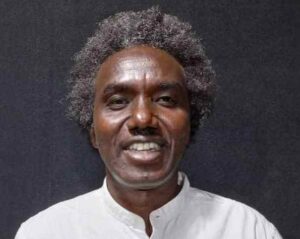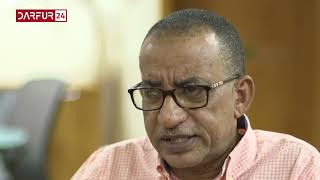It has been almost one year since the Sudanese army commander Abdel Fattah Al-Burhan staged a military coup on October 25, 2021 and ousted the civilian transitional government led by prime minister Abdallah Hamdoyuk . Alburhan facing domestic and international pressures has not been able to actually rule or form a government.
Sudanese political memory preserves long periods of military rule compared to very short periods of civilian rule, which is termed in the political literature as the “evil circle” in an explanation of the fluctuations of the situation from revolution or uprising, then democracy, then a military coup and then another uprising.
The question then arises: Why do the political parties not stand firm after the revolutions, and soon the military overthrows the government?
The question of authority is superior to the question of establishment
Professor of Public Policy and Administration at Long Island University, USA; Bakri Al-Jack believes that political parties have problems related to totalitarian regimes that transformed the parties into a mere sound phenomenon of expression, ending up within their organizational framework into something similar to the relationship of “the sheikh and the disciple.” The parties did not find an opportunity to build for this reason.

Bakri adds in an interview with “Darfur 24” that the issue is not only related to the ruling totalitarian regimes; There is a structural, cultural and social problem. For Bakri, the tribal and sectarian mind is present in all the country’s institutions and organizations.
He added, however, that the problem is social, but it appears in parties and other entities, pointing out that society is unable to produce a modernist structure.
The bottom line for Bakri Al-Jak that the parties in their current state are one of the threats to the transition because they are more concerned with the question of authority than the question of foundation.
Editor-in-chief of Elaph newspaper Khaled Al-Tijani, agrees with Bakri Al-Jak that the structural composition of the parties is a major obstacle to democracy, because democracy can only be achieved through the presence of democratic parties.
Khaled Al-Tijani says in an interview with Darfur24 that the current situation of the parties is the reason for the failure of all stages of the transition since independence. Al-Tijani divides the parties into two types: traditional parties such as the Umma and Al-Ittihad parties, although they adopt democracy, but their structure hinders the achievement of this goal.
The editor-in-chief of Elaph newspaper clarifies that the December revolution is completely different from “October 1964” and “April 1985” as it dug deep into society, as well as the path of its movement from the periphery to the center, and that its strength was youth, all of which was greater than the absorptive capacity of the party systems.
During the period following the December revolution, political parties encountered widespread of hate speech from within the revolution camp.
Al-Tijani refers to the Sudanese Congress Party, saying that it is the party most trying to get out of this circle. It is a youthful and modern party, but it has become a prisoner of the old political club, according to Al-Tijani.
The coup of the army commander in October last year showed clear discrepancies within the Forces Freedom and Change alliance, so that these discrepancies were transmitted within a number of parties, some of which now show two currents, each expressing a different position, amid the fluidity of statements of denial and clarification.
This highlighted the question of democratic practice within the parties, enabling them to lead the country during the transition period.
The pending organizational entitlement
The parties suffered for long periods due to the policies of the totalitarian regimes, but despite that they resisted and remained effective, according to the head of the Sudanese Congress Party;
Al-Degair acknowledges that what is expected of the parties after the December revolution is to get out of the state of fragility, as no society can achieve a decisive victory for tyranny if it is satisfied only with the political justification of tyranny.
He continues, “We in the Sudanese Congress are keen to adhere to the democratic organizational benefits, since 1986 until today, the leadership of the parties has held 5 presidents.”
The Sudanese Congress Party will hold its sixth conference next January, according to Al-Diqair, but funding is a problem facing this organizational entitlement.
Al-Degair says that the parties are now preoccupied with resisting the coup, but as long as the larger role falls on the parties in establishing real democratic organizations, they must fight through two avenues; Resisting the coup and resisting its fragility with the aim of organizational reform.
Member of the Political Bureau of the National Umma Party;Zainab al-Mahdi sees the transition itself as a very big challenge and many countries have suffered from it, pointing out in an interview with Darfur24 to the destruction inflicted on the structure of the parties, a destruction that began early in the years of the May regime to complement the years of rescue, according to Zainab.
Since the fall of Al-Bashir in April 2019, it has not been observed that any political party has made an organizational commitment to keep pace with the great changes brought about by the December revolution.
Al-Mahdi says, “We in the Umma Party were unable to hold the eighth general conference because of the general conditions that all parties suffered, which are represented in impoverishment and penetration.”
From Zainab’s point of view, a large part of what the parties suffer is fabricated and not real. She continued, “We in the Umma Party issued the decision to form the Supreme Committee for the Eighth Conference, which is a long-delayed entitlement.”
The party views the Eighth Congress as a new foundation because of the great changes that have taken place, building from the bottom up to inject new blood, but funding represents one of the challenges of the congress, according to Zainab.
Between the state of partisan fragility, the faltering of the constitutional and organizational entitlement of the parties, and the present challenges, economically, security and politically, the political forces remain one of the threats to the transition along with many threats, however, the decisive factor in the transition process is the availability of the will.

